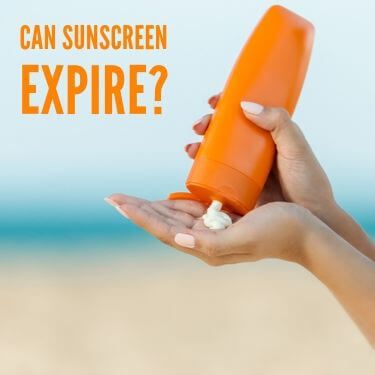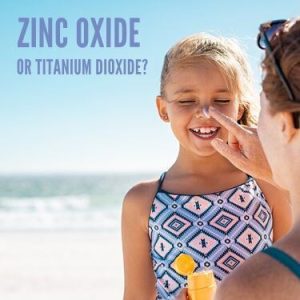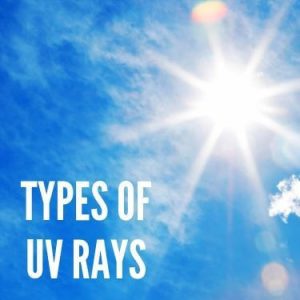
 Copy URL to Clipboard
Copy URL to Clipboard
Can you use expired sunscreen after its expiration date? Can sunscreen expire or is it all a hoax to make the sunscreen companies more money? We’ve all wondered the same thing when we ponder whether or not to throw out our sunscreen or roll the dice with our skin. We’ll show you the process to make sure you know the ins and outs of the sunscreen expiration date.
Sunscreen is required by the Food and Drug Administration (FDA) to have a valid expiration date on each bottle you purchase at a retail store. The only time your sunscreen doesn’t have a specific expiration date is if the FDA has agreed it’s good for three years from its purchase date. All sunscreen expires and should be discarded after its expiration date.
Table of Contents
Well, you can use anything past its expiration date if you feel the need to. But should you use expired sunscreen or other sun protection products? And when does sunscreen expire? To be safe, you should follow the FDA-mandated expiration date on your sunscreen. Most sunscreens outlive their usefulness from an SPF standpoint after 2-3 years. When in doubt, throw it out. Some say, however, that sunscreen is still good for approximately six months after the product’s expiration date if you need to use a bottle of sunscreen in a pinch.
Look for the expiration date printed on your sunscreen bottle to see if your product remains effective. If you cannot find an expiration date and no longer have your proof of purchase to determine when your three-year expiration date ends, try calling the customer service contact number on the bottle’s label. There are codes on the bottle that customer service representatives can use to determine whether your sunscreen is still valid or needs to be tossed out.
Neutrogena sunscreen is a good example of sunscreen that typically does not have an expiration date on it. That’s because this product has proven to the FDA its longevity will last three years from the date of purchase. Don’t keep it past the three-year proof of purchase date.
The sunscreen expiration date code is typically found near the sale bar code on a bottle of sunscreen.
The short answer is yes. Even if it’s been sitting in a medicine cabinet for years and still has a seal on it, it should be thrown out if your sunscreen’s expiration date has passed or it’s been more than three years since you purchased the product.

Which sunscreen should you use to prevent skin cancer most effectively? Neither zinc oxide nor titanium dioxide has a better expiration date if that’s what you were thinking! Here’s the download, though, on the two types of sunscreens.
Once your sunscreen has expired, empty its contents and rinse out the container to avoid the product being used after its expiration date. Next, recycle the container if it’s a recyclable plastic or take the bottle to a hazardous waste collection event in your neighborhood.
As far as expiration dates go, SPf 50 sunscreen lasts the same as other sunscreens. Adhere to the expiration date on the bottle or the three-year rule from the time of purchase.
When you are talking about how long SPF 50 lasts on your body, it’s typically a two-hour effective time from the time you put it on before you have to re-apply the SPF 50 sunscreen.
The following standards exist for sunscreen application:
No sunscreen on the market today offers 100% UVB ray protection. Higher SPF sunscreen products, though, may help with skin damage and protect against skin cancer in the long-term.
Chemical sunscreens actually seep into the skin and absorb UV rays, converting the rays to heat and releasing them from your body. include the following active ingredients: Avobenzone, oxybenzone and octinoxate. Chemical sunscreens are better for active swimmers and other athletes. These sunscreens are water resistant.
Physical sunscreens actually block UVB rays by sitting and protecting the top of the skin and reflecting the rays of the sun off your skin, acting as a shield. Zinc oxide and titanium are the main ingredients in physical sunscreen. Physical sunscreens are less irritating for those with sensitive skin and act as a moisturizer.
Most dermatologists say that you should choose the sunscreen that works best for your body. You are protected either way when you wear sunscreen.

UVA rays dive deep into the dermis of your skin, which is the thickest part of a human’s skin. These rays can cause aging of the skin and wrinkling.
UVB rays burn the top layers of your skin and can lead to skin cancer unless you wear sunscreen as recommended.
Wear a broad spectrum sunscreen that protects against both types of sun rays to have maximum protection from the sun at all times.
Did you know that applying sunscreen can make or break your maximum protection from the harmful rays? Follow these steps to ensure UV ray protection:
Connect with R+L Global today to help ship your beauty products on time and safely through white glove logistics services. We also offer:
Call 866-989-3082 or email or chat with us today so we can make your life easier and get you started on a roadmap to logistics success for all of your beauty product shipping needs.
